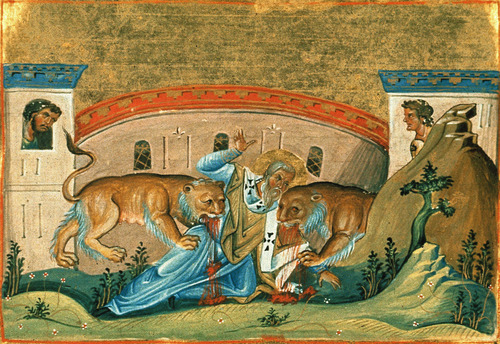
HOMILY for St Ignatius of Antioch
Rom 3:21-30; Ps 129; Luke 11:47-54
We often forget that the Scriptures, the New Testament, is a product of sacred Tradition, that is to say, of truths handed down by word of mouth and example, from one generation to another. St Ignatius bears witness to this because his writings testify to the faith of the 1st-century Church, linking us to the apostles and the sacred Tradition they taught, the memory of Christ’s life that men like Ignatius, the so-called Apostolic Fathers kept alive. It is quite likely that only in the lifetime of St Ignatius did the Gospels come to be written, so we celebrate today one of the eyewitnesses to our Faith; one who knew the Apostles, converted to Christianity, and learnt the Faith of the Risen Lord from the Apostles. St Ignatius would later become the third bishop of Antioch from the year 70; St Peter had been the first bishop of that apostolic See.
In recalling this, we recall too the ancient Church of Syria, for when St Ignatius was sent to Rome to be executed in 107, the historian Eusebius says that Ignatius “was sent from Syria to Rome and became food for wild beasts on account of his testimony to Christ”. On this journey to Rome through Turkey and Greece, Ignatius wrote six letters to the local Christian communities through which he passed, and one to the bishop of Smyrna, St Polycarp, a disciple of St John the Apostle, who was also martyred in 155. The letters he wrote were addressed to the Church in Smyrna, Philadelphia, Rome, Tralles, Magnesia, and Ephesus.
These letters are a precious witness to the living Tradition of the Church and our apostolic faith. As Pope Benedict XVI said: “In reading these texts, one feels the freshness of the faith of the generation which had still known the Apostles. In these letters, the ardent love of a saint can be felt”. For St Ignatius’ writings show his deep desire for union with God through love, which was reflected in the unity of the Church as a communion of love, held together in charity by her bishops, priests, and deacons. For, as St Paul says today: “God is one” (Rom 3:30).
It was this deep love for Christ and for the Truth of the Gospel that would lead St Ignatius to his death in the Roman Colosseum. Thus he followed the example of sacrificial love given by Christ, the king of martyrs. But his martyrdom doesn’t just show his love for Christ, but also his hope and his faith. For martyrdom makes no sense without belief in Christ’s Resurrection. So, St Ignatius of Antioch, by his writings and his blood, witnesses to the Church’s fundamental faith in the Resurrection; a faith that is ours today, and that we’re called to share with others.
In doing so, these words from St Ignatius are worth remembering, and they echo Christ’s criticism of the lawyers in today’s Gospel. St Ignatius said: “Christianity is not a matter of persuading people of particular ideas, but of inviting them to share in the greatness of Christ. So pray that I may never fall into the trap of impressing people with clever speech, but instead I may learn to speak with humility, desiring only to impress people with Christ himself”.
May St Ignatius pray for us, for the Church in Syria, Turkey, and Greece, and for all who would preach the Faith, that we may always impress with Christ himself, that is, through love.
 he-hasmewonderstruck reblogged this from lawrenceop
he-hasmewonderstruck reblogged this from lawrenceop  he-hasmewonderstruck liked this
he-hasmewonderstruck liked this radioteopoli reblogged this from peterapostle
 peterapostle reblogged this from lawrenceop
peterapostle reblogged this from lawrenceop  peterapostle liked this
peterapostle liked this lawrenceop posted this